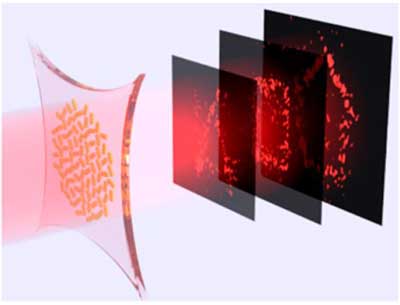| Posted: May 10, 2017 |
Stretchable hologram can switch between multiple images
(Nanowerk News) The possibility of sending and receiving holographic messages has long tantalized sci-fi fans. Although we're not there yet, scientists have now created holograms that can change from one image to another as the materials used to generate them are stretched.
|
|
The study detailing how they did it appears in ACS' journal Nano Letters ("Strain Multiplexed Metasurface Holograms on a Stretchable Substrate").
|
 |
| Holograms made with stretchy materials could lend themselves to animation. (Image: ACS)
|
|
To make their holograms, Ritesh Agarwal and colleagues turned to metasurfaces, which are flat, ultra-thin nanostructured surfaces. Previous studies have already used such materials to create 3-D and multi-color holograms, and Agarwal's team has made them recently by embedding gold nanorods in a stretchable film of polydimethylsiloxane (PDMS).
|
|
Building on this work, Agarwal wanted to understand how a holographic image changes with stretching and to see if they could use this information to create a hologram that can switch between images.
|
|
Using computational models and experiments, they calculated how much a holographic image expands as the material generating it stretches, and how far the image plane moves away from its original position.
|
|
Based on these findings, they created multi-layered holograms made up of two or three different images. As the surface stretches, one image appears in the place of another. So, for example, a pentagon appears at 340 micrometers away from the film in its relaxed state. Pulling on the material by a certain amount makes a square appear, and stretching it even further replaces the square image with a triangle.
|
|
The new method could have applications in virtual reality, flat displays and optical communications.
|

